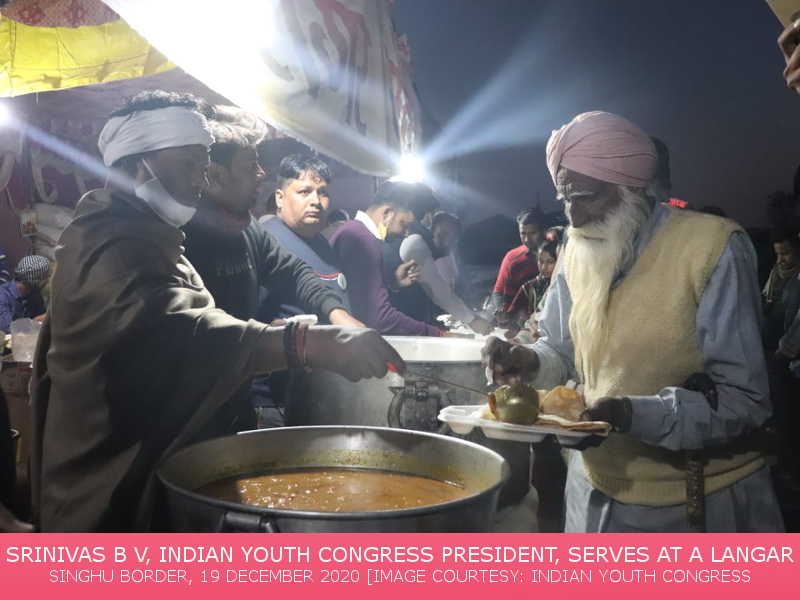By Sarabjeet Dhody Natesan
The crowds at the Singhu border are increasing. The government is citing Cold and Covid, among other things to persuade the agitating farmers to return home.
From the reports that I have been reading, besides the inclement weather and the virus, another big issue at the protest sites is the non-availability of clean bathrooms with running water to bathe and wash clothes. And of course, the total absence of hot water.
Women have to wait for almost two hours to use the few bathrooms, and men are using fields and open areas. Women are also walking to nearby malls, gas stations, shopping complexes, and knocking on the doors of many homes to use clean bathrooms. Given the staggering numbers, clean places become dirty soon. Some generous people have indeed opened their homes and are sharing their bathrooms and are also providing water to the free laundries that have come up very quickly. Washing machines are running non-stop, washing up to 500 garments a day. But, they too seem inadequate, in the face of the rising numbers; everyone wishing to be present, to mark their attendance and express their solidarity at the holy site of the farmers’ agitation.
Women are also finding it difficult to bathe before cooking the langar because of the lack of bathrooms and privacy, and the biting early morning cold. But to their credit, they are waking up even earlier than usual, often at 3 am, still standing in long queues, waiting for close to 2 hours, bathing, and then going straight to the makeshift kitchens, to start their Sewa. Old men are also finding the going tough, the cold weather and lack of accessible toilets is a big issue for them too. Their presence at the Langar Sewa being as important, they are now making sure that they bathe at night and at odd hours to be ready for the early morning kitchen work. All adhering to the ‘Maryada‘ of the Langar which requires that it be made with clean hands.
Despite the challenges, they are all there.
Old, young, men, women.
Unmoved and Resolute.
I also read that the farmers are being mocked for what they are eating, dry fruits, pizza, biryani, paneer, two vegetables, rice, chappaties, lassi, dahi, and deserts. They fail to note that this is not just for the agitating farmers, but it is available to all at the Langar, which was the first tent to be set up, even before the arrivals of the kissans from the villages.
I am also told that even in the face of the work required to roll and ‘saeko‘ chappaties, and making fresh wheat flour dough, they are adamant tthat they will eat only chappaties. Can’t they adjust?
Those who ridicule and criticize them should marvel at them instead. They don’t realize the superhuman effort, not only of the body but also the heart and mind, required to feed so many. They are ignorant of the fact that it is enshrined in the culture that they are born into, starting from the time Nanak cultivated his fields at Kartarpur Sahib. Langar is not work, it is a matter of faith enshrined in the three teachings of Baba Nanak: Keerat Karo, Naam Japo, Wand Chakho.
In a society forever looking for shortcuts, where warmed frozen wheat tortillas have replaced freshly made hot chappaties in our kitchens for even our children and family, to see people undertake the tedious job of kneading large amounts of flour into the dough, roll out a large number of chappaties, and toss and bake them on hot tawas, over open wood fires that can singe the eyes must be bewildering. To witness old men slave over hot fires and meditatively and constantly stir the degchis, the cauldrons of daal, to make sure that the food does not stick to the bottom of the vessel must be tiresome in itself. To a society that can hardly be bothered to serve itself, to then observe the food being served respectfully to all those who have gathered to partake of the langar must be astounding. It must be beyond the society that ridicules this protest to see the vessels and utensils being washed up and readied for the next meal.
To get up at the crack of a cold winter dawn, to get the Langar ready on time to feed people you don’t even know, to start cooking all over again, after finishing the first and the second and the third, unmindful of the fatigue and tired bodies, is indeed an act of pure selfless love. When they share, they count their blessings and end up sharing their blessings too.
The Langars are filling the stomachs of the agitating farmers, the police on duty, the many visitors out there to express their solidarity, and the poor and hungry of the areas where the protestors have stationed themselves. Hungry children, mothers, unemployed men are all welcomed, requested to sit in rows, and served hot meals. Served honorably to honor the food and the receiver. Food that the little children and unfortunate ones have not been able to access for a long time, no cap on the numbers, and no limit on the quantity. Big vessels full of food, once empty, are replaced with equally big ones, full of more food. Everyone is waiting patiently for their turn to be served, with no visible fear and no palpable anxiety that the food will run out before their turn comes. For everyone knows that this is Guru’s Langar. The fires will burn and the vessels will stay hot, for as long as it is required.
The sharing, humility, morality, and restraint that is evident in the farmers is a lesson for all. The fight is righteous, the means are just and the outcome will be won.
Nanak Naam Chardi Kala,
Tere Bhane Sarbaat Da Bhala.
Disclaimer: The opinions expressed within this article are the personal opinions of the author. AlignIndia does not take any responsibility for the content of the article.
(Sarabjeet Dhody Natesan is a student of Economics and Policy and teaches at a Liberal Arts University in the South of India. She lives near her favourite seashore, in Chennai, with her family)


